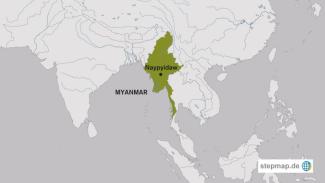Economy
A wealthy rice farmer

50-year-old U Thein Win owes his new wealth to a big investment in his farm: a rice-harvesting machine running with diesel. Three years ago, he bought the machine in the capital Yangon for the equivalent of $ 3,500. That is quite a sum in a village where the annual per capita income hovers around the $ 1,000 level.
Before he made this huge investment, U Thein Win was a normal rice farmer like all other 300 inhabitants of his village in the Bago region. But unlike the other villagers, he earned extra money by engaging as rice trader and saved his earnings until he could afford to buy the harvesting machine.
Now he rents it out to farmers in the area. He charges $ 35 per hectare. He says he earns “about 70 % more per month than in the past – and I can afford things like the fridge, a TV set and a solar power system to generate electricity”.
U Thein Win is still waiting for his village to be connected to the national power grid. According to the World Bank, over 80 % of rural households in Myanmar have no access to electricity. Even privately owned solar systems like the one U Thein Win owns are not very powerful and tend to fail in the rainy season. This is a serious impediment to most businesses. Without electricity, U Thein Win cannot fix his machine and has to send broken parts to the neighbouring town.
U Min Lwin is one of the farmers who rents this machine. The 53-year-old has 45 hectares of land near the village, and even more importantly, near the river. Six years ago, the local government built a dam. Now U Min Lwin can flood his fields and grow rice and beans the whole year through. Before the construction of the dam, he could only cultivate vegetables in the rainy season. Back then, his income was much smaller and the quality of the rice was not as good.
In former times, it took “three to five days to harvest only one hectare by hand,” says U Min Lwin. Now the work is done in one hour. “We will manage our harvest in about three days, whereas in the past it used to take up to 50 days,” he claims. Moreover, he is now able to buy high-quality fertiliser and herbicides that have “almost doubled the output of the crops”.
Land ownership remains a difficult issue. U Bo Bo, for instance, owns only three hectares of land, too far from the river to irrigate. The smallholder can only grow one crop of rice in the rainy season. He struggles to earn the monthly $ 100 he needs to feed his family. While U Thein Win has his harvesting machine, but for other farmers, it is still a struggle to survive.
Eva Casper is a German journalist currently living in Myanmar.
eva.casper81@gmail.com







